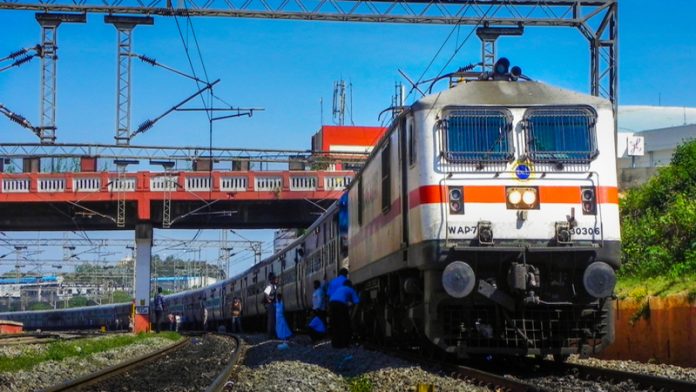This article is written by Priyanshi Soni, a student of Symbiosis Law School, Noida. This article seeks to discuss the privatisation of Indian railways and the questions raised regarding it, along with stating the merits and demerits of the same.
Table of Contents
Introduction
Indian Railways are credited for serving the largest democracy in the world. It is one of the highest revenue-generating industries in India. After around 167 years after the start of Railways in India, Tejas Express, which was an initiative of the Indian Railway Catering and Tourism Corporation (IRCTC), was started as India’s first (partially) private train. The train has done incredibly well so far, both in terms of reviews and finances. It is almost at break-even in the first quarter. The Mumbai-Ahmedabad Tejas has seen increased occupancy, and this may be a stepping stone for the introduction of private enterprises.
The second term of the Narendra Modi government introduced the idea of privatizing Indian Railways, as the railways continue to struggle with financial difficulties despite an improving operating ratio, and are still far from achieving an optimal financial position to sustain railway operations, which the Government believes can be achieved through its privatization.
There has also been a debate going on in recent times regarding the complete privatisation of railways. Is there really a need to privatise them or should it rather be totally owned by the Government? Or, is any mid-way possible? Let us examine the possibilities of privatisation of Indian Railways and the stand of the Government with regard to the same.
The questions raised regarding privatisation
Indian Railways are an age-old service that we are provided with. With the changing needs of the economy, the Government is of the view to privatise it. There is a long debate going on whether privatisation will be beneficial to the general public or will it prove to be disadvantageous as the accessibility will then become disproportionate, due to income disparity. Another question relates to the manner in which the market forces will impact Indian Railways and the way the Government will tackle any financial withdrawal, post-privatization.
The coming of privatisation will also raise concerns about which areas private players will focus on, who will control railway operations, and how the distinction between the Government and the private players in all sectors will be drawn. If private players’ judgments and railway organisation outweigh the interests of employees, it may have a significantly negative influence on employee welfare and ultimately lead to the organization’s end.
The origin of current reforms
In 2015, an official committee, headed by NITI Aayog member Bibek Debroy, recommended several reforms concerning the Indian Railways, restructuring the Railway Ministry, and suggested a complete overhaul of the railway board and entry of private players. Unification of the railway budget with the Union Budget was also suggested by the committee which was then implemented by the National Democratic Alliance (NDA) Government in 2016. It was pointed out by the committee that there is increased competition in the road transport sector. Low passenger fares and high freight rates have led to a preference for road transport.
But, the committee supported liberalization as a way of giving entry to private players instead of straightaway terming it as “privatisation”. In its view, this will help in improving services, growth, increase in healthy competition, etc. which will be beneficial for all.
Opening of the sector
In 2017, the then Union Railway Minister Suresh Prabhu launched the “largest transit-oriented development program ever executed in India” for reform and overhaul of 400 stations. He wanted to open the entry of private players, like airport mode, and lease them for 45 years. But in 2019, NITI Aayog’s Chief Executive Amitabh Kant wrote that there is a delay in implementations of the same. Finally, in 2020, the process to allow private trains on 109 routes began. The Indian Railways plans to introduce the private trains in phases due to start from 2023-24.
The debate on fares and prices
The major question that is raised is that will the privatisation of Indian Railways lead to an increase in fares and prices? Last year, it was clarified that only the private concessionaire will decide the fares for private trains. Now since the maker will decide the price, there is a good possibility of higher fares for these trains. But, it is also the stand of the ministry that the operation of these trains will be independent. That means, it signifies that there should be no interference with the regular fare prices.
Opposition’s stand
The opposition stood against the privatisation of Indian Railways as they contended that the operation would be handed over to few players and would result in fare price hikes.
Piyush Goyal, who was the Union Railway Minister, said recently that the Railways will never be privatised but private investment will be encouraged. “Let me make it clear, the Indian Railways will never be privatised, Indian railways is India’s asset and will continue to remain so and belong to the people…If a railway line is installed should there not be the need to ensure good services to the passengers and higher speed trains? And if any private investment comes, I feel it should be welcomed.” – Piyush Goyal.
Merits of privatisation of Indian Railways
Indian Railways has devolved into an ineffective and bureaucratic monolith over time. The merits of privatisation of Indian Railways are discussed as follows:
Efficient services
In many aspects such as catering and punctuality, railways lack efficiency and if private players enter into the handling of organization, then these services will become more efficient.
Increase in revenue collection
Right now, both freight and passengers are maintained by a single entity, so there is an imbalance in profits and losses for each other. If private players enter, giving world-class service, there will be an increase in revenue collection.
Introduction of latest technology
The allowance of international private players will lead to the introduction of the latest technology which will improve accountability, unlike present times when accidents are rising.
Normalization of prices due to competition
An increase in competition is important for the growth of the sector which would be ensured when private players enter and hence lead to overall betterment in the quality of services. This will normalize the prices charged as now the competition will be on the increase and thus, quality would also become better.
Demerits of privatisation of Indian Railways
Coverage
It is a big advantage if the railways are government-owned as it helps in wide coverage throughout the nation. On the contrary, when it is privatized, the less popular routes would get neglected leading to poor connectivity. Mainly, the regions such as hilly areas and North-Eastern states will get neglected.
Increased fares
Increased fare prices are a major problem that might crop up with the coming of privatisation. The private players would be more concerned with making a profit which will result in a rise in prices, resulting in poor reach to all segments of society. This will undermine the very purpose of railways and may result in a loss to road transport.
Also, taking the social welfare concerns into account, privatisation will lead to high-cost transportation of goods across the country.
Conflict of interest
Since the Ministry of Railways is given the charge of service providing, policymaking, and regulation, there are fewer chances of conflict of interest, and the interest of the entire system is maintained well. But if privatisation happens, there will be conflicting interests between the Government and its investors.
The future of privatisation
As we have examined the pros and cons of privatisation, it is now clear that total substitution by any one player can result in many drawbacks. The need is the co-operative working of Government and private sector. The function of privatization is not to override employee and passenger benefits, but also to regulate infrastructure development, with disinvestment in the freight segment which would further help the concentration of investments in diverse sections of railway operations with the engagement of private players in helping the Government supplement its efforts in the sustenance of railway operation.
It cannot be said that railways can depend totally on the private sector. Definitely some sort of government help is needed. For better connectivity and reach, it is important that the Government keeps a check on the working of the sector. The needs of economically backward people can only be addressed by the Government’s support and supervision. It is, therefore, necessary to have a partnership, rather than a complete substitution.
In response to the recent Parliamentary debate, Railway Minister Piyush Goyal said that the railways will never be privatised totally. He clarified that the Government is working more on passenger safety. He said the 5,500 km track is going to be privatized this year and talked about the Government’s target of complete electrification by December 2023. It is true that the core sectors can be corporatized, which refers to the restructuring or transformation of a state-owned asset or organization into a corporation, rather than privatized.
The Niti Aayog strategy for New India @ 75 includes various targets in railway infrastructure, such as raising infrastructure development speed from 7 km/day to 19 km/day by 2022-23. Privatisation will thus help in the development of better infrastructure.
A study on the privatisation of railways
In a recent study conducted by a few BA.LLB students on privatisation of Indian Railways found that most of the common people are not happy with the idea of privatisation as they know that standard of service will do get an increase, but they also are aware regarding increased fare prices which are inevitable. The majority of people are rational and are of the middle class, those who choose rail transport. Thus, people are generally suggesting to not privatise it as it will be disadvantageous for those who heavily depend on the railways as a means of transport.
Conclusion
The railways are the largest means of transportation. But in many aspects, it lagged behind; such as in terms of punctuality and accountability, as we discussed above, The private sector can better manage the service. There are increased cases of accidents as well, which calls for a proper modern technological setup in place.
In recent times, due to the increase in the public mass interface, the Government has made it clear that it is important to open it up, although refused to call it privatization. It is important to modernize the railways to meet up with the modern demands and also to match globally in terms of developments. The need of the hour is thus a balanced approach by both the Government and private players.
References
- https://www.irtsa.net/pdfdocs/Privatisation-in-Indian-Railways-Historical-Facts.pdf
- https://theprint.in/talk-point/should-indian-railways-be-privatised-to-prevent-it-from-going-the-air-india-way/341685/?amp
- https://www.drishtiias.com/daily-updates/daily-news-editorials/privatizing-indian-railways
- https://www.hindustantimes.com/india-news/the-story-of-indian-railways-and-its-tryst-with-privatisation-101617274857901.html#:~:text=The%20sources%20of%20opposition&text=Union%20railway%20 minister%20Piyush%20 Goyal,passenger%20services%20and%20improve%20infrastructure.
- https://www.hindustantimes.com/india-news#:~:text=INDIA%20NEWS-,The%20story%20of%20Indian%20Railways%20and%20its%20 tryst%20with%20 privatisation,-The%20railways%2C%20in
- https://www.thehindu.com/news/national/indian-railways-will-never-be-privatised-goyal-in-lok-sabha/article34081812.ece
- https://poseidon01.ssrn.com/delivery.php?ID=244094087111098084084084096082003122002041002072040074081007124108031102090085017092110057106062021112049088104002026023109082119017001015088016090109065077098092028020036007092111003087007124068029069000103112016083069010089116001064126029089025066000&EXT=pdf&INDEX=TRUE
- https://acadpubl.eu/hub/2018-120-5/3/279.pdf
- https://www.researchgate.net/profile/Chitresh-Shrivastva/publication/340539510_Privatization_of_Indian_Railways_Possibilities_and_Challenges/links/5fcf219292851c00f85badee/Privatization-of-Indian-Railways-Possibilities-and-Challenges?origin=publication_detail
Students of Lawsikho courses regularly produce writing assignments and work on practical exercises as a part of their coursework and develop themselves in real-life practical skills.
LawSikho has created a telegram group for exchanging legal knowledge, referrals, and various opportunities. You can click on this link and join:
https://t.me/joinchat/J_0YrBa4IBSHdpuTfQO_sA
Follow us on Instagram and subscribe to our YouTube channel for more amazing legal content.
 Serato DJ Crack 2025Serato DJ PRO Crack
Serato DJ Crack 2025Serato DJ PRO Crack









 Allow notifications
Allow notifications


